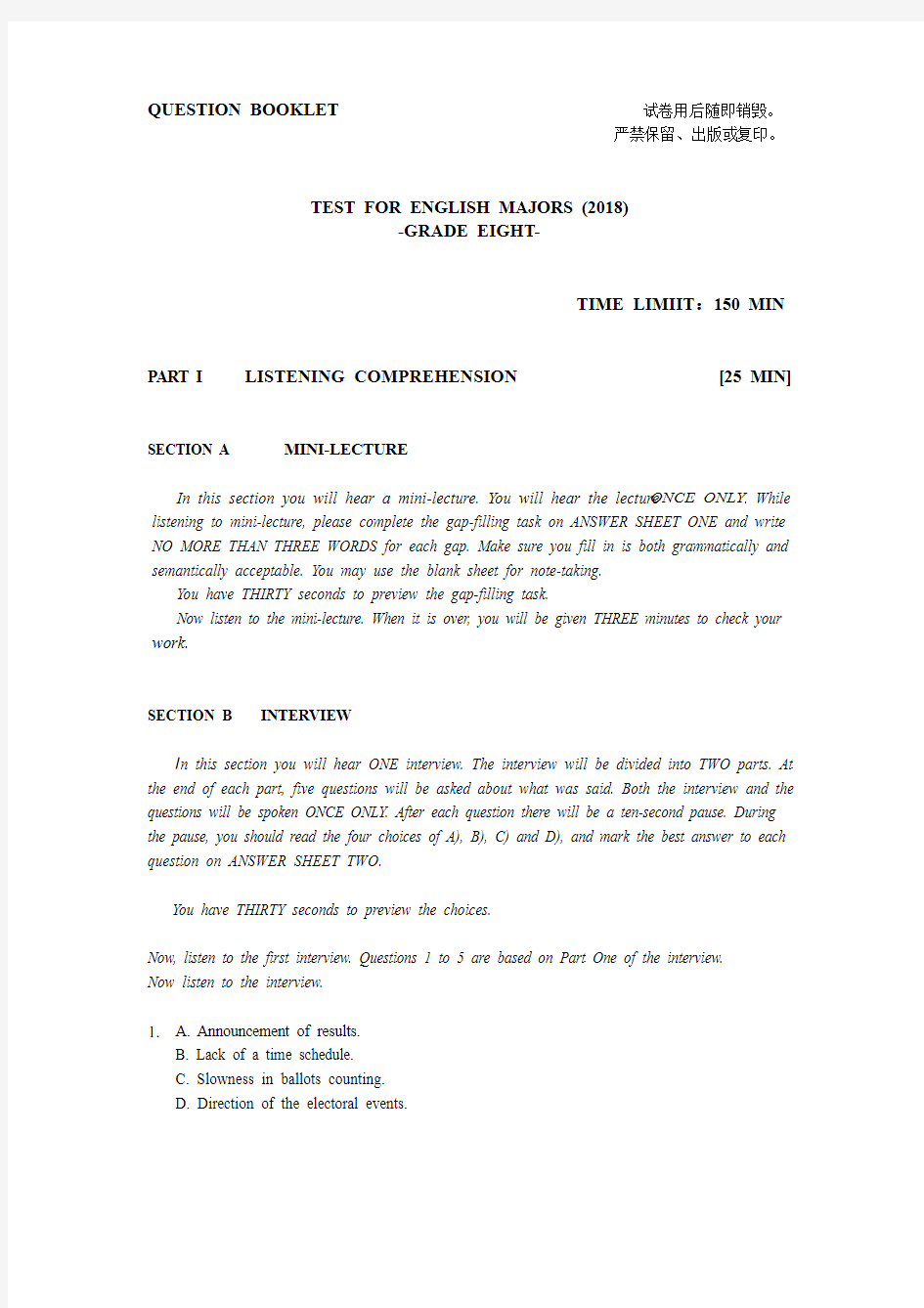
2018年英语专业八级真题
- 格式:docx
- 大小:99.10 KB
- 文档页数:14


QUESTION BOOKLET 试卷用后随即销毁。
严禁保留、出版或复印。
TEST FOR ENGLISH MAJORS (2018)
-GRADE EIGHT-
TIME LIMIIT:150 MIN PART I LISTENING COMPREHENSION [25 MIN]
SECTION A MINI-LECTURE
In this section you will hear a mini-lecture. You will hear the lecture ONCE ONLY. While listening to mini-lecture, please complete the gap-filling task on ANSWER SHEET ONE and write NO MORE THAN THREE WORDS for each gap. Make sure you fill in is both grammatically and semantically acceptable. You may use the blank sheet for note-taking.
You have THIRTY seconds to preview the gap-filling task.
Now listen to the mini-lecture. When it is over, you will be given THREE minutes to check your work.
SECTION B INTERVIEW
I n this section you will hear ONE interview. The interview will be divided into TWO parts. At the end of each part, five questions will be asked about what was said. Both the interview and the questions will be spoken ONCE ONLY. After each question there will be a ten-second pause. During the pause, you should read the four choices of A), B), C) and D), and mark the best answer to each question on ANSWER SHEET TWO.
You have THIRTY seconds to preview the choices.
Now, listen to the first interview. Questions 1 to 5 are based on Part One of the interview.
Now listen to the interview.
1. A. Announcement of results.
B. Lack of a time schedule.
C. Slowness in ballots counting.
D. Direction of the electoral events.
2. A. Other voices within Afghanistan wanted so.
B. The date had been set previously.
C. All the ballots had been counted.
D. The UN advised them to do so.
3. A. To calm the voters.
B. To speed up the process.
C. To stick to the election rules.
D. To stop complaints from the labor.
4. A. Unacceptable.
B. Unreasonable.
C. Insensible.
D. Ill considered.
5. A. Supportive.
B. Ambivalent.
C. Opposed.
D. Neutral.
Now listening to Part Two of the interview. Questions 6 to 10 are based on Part Two of the interview.
6. A. Ensure the government includes all parties.
B. Discuss who is going to be the winner.
C. Supervise the counting of votes.
D. Seek support from important sectors.
7. A. 36%-24%.
B. 46%-34%.
C. 56%-44%.
D. 66%-54%.
8. A. Both candidates.
B. Electoral institutions.
C. The United Nations.
D. Not specified.
9. A. It was unheard of.
B. It was on a small scale.
C. It was insignificant.
D. It occurred elsewhere.
10.A. Problems in the electoral process.
B. Formation of a new government.
C. Premature announcement of results.
D. Democracy in Afghanistan.
PART ⅡREADING COMPREHENSION [25 MIN] SECTION A MULTIPLE CHOICE QUESTIONS
In this section there are three passages followed by fourteen multiple choice questions. For each multiple choice question, there are four suggested answers marked A, B, C and D. Choose the one that you think is the best answer and mark your answer on ANSWER SHEET TWO.
PASSAGE ONE
(1) “Britain’s best export,” I was told by the Department of Immigration in Canberra, “is people.” Close on 100,000 people have applied for assisted passages in the first five months of the year, and half of these are eventually expected to migrate to Australia.
(2) The Australian are delighted. They are keenly ware that without a strong flow of immigrants into the workforce the development of the Australian economy is unlikely to proceed at the ambitious pace currently envisaged. The new mineral discoveries promise a splendid future, and the injection of huge amounts of American and British capital should help to ensure that they are properly exploited, but with unemployment in Australia down to less than 1.3 per cent, the government is understandably anxious to attract more skilled labor.
(3) Australia is roughly the same size as the continental United States, but has only twelve million inhabitants. Migration has accounted for half the population increase in the last four years, and has contributed greatly to the country’s impressive economic development. Britain has always been the principal source – ninety per cent of Australians are of British descent, and Britain has provided one million migrants since the Second World War.
(4) Australia has also given great attention to recruiting people elsewhere. Australians decided they had an excellent potential source of applicants among the so-called “guest workers” who have crossed their own frontiers to work in other arts of Europe. There were estimated to be more than four million of them, and a large number were offered subsidized passages and guaranteed jobs in Australia. Italy has for some years been the second biggest source of migrants, and the Australians have also managed to attract a large number of Greeks and Germans.